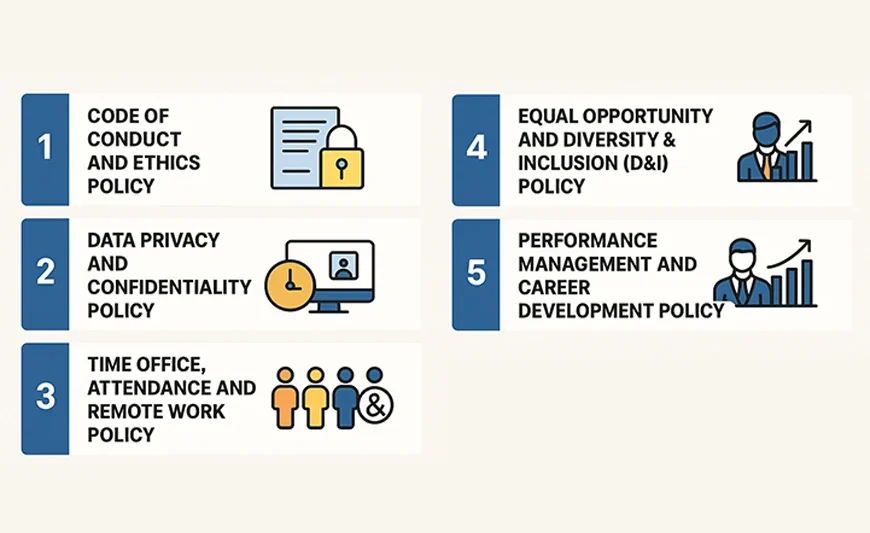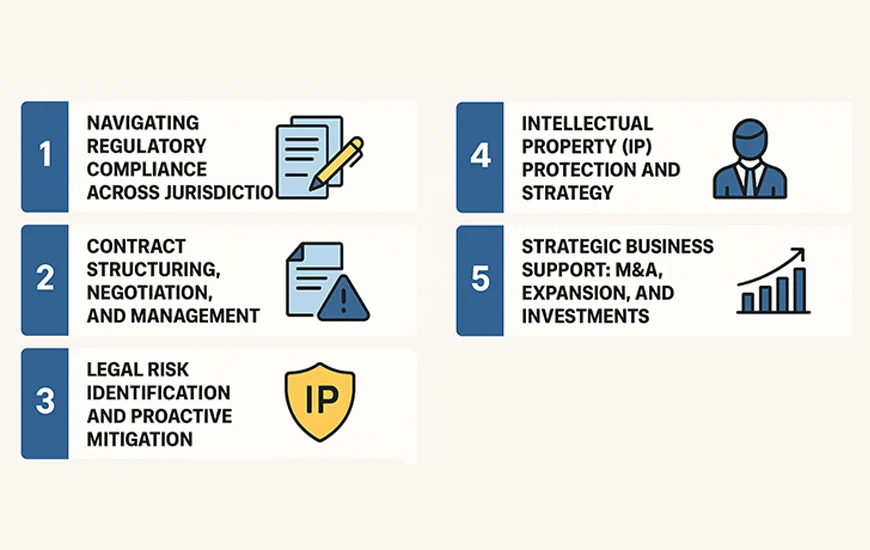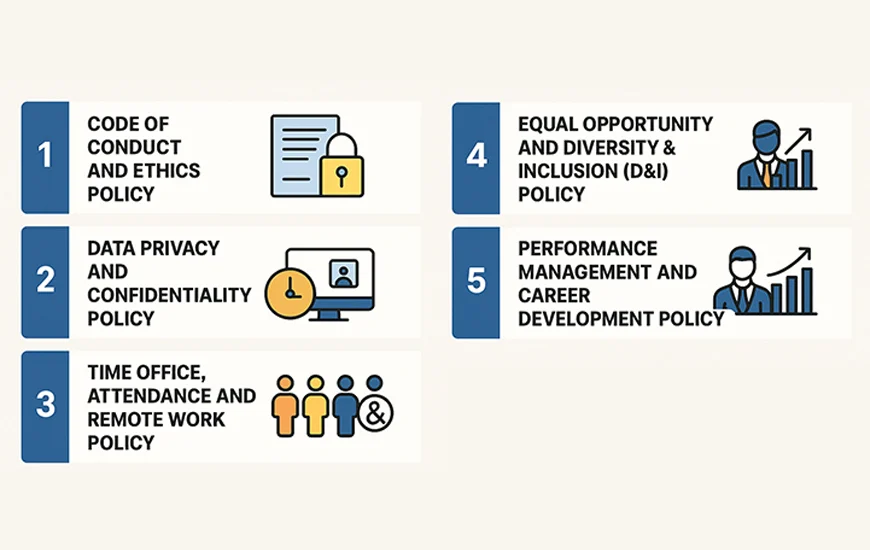
In the ever-evolving and competitive environment of Information Technology (IT) and Business Process Outsourcing (BPO), Human Resource (HR) policies play a vital role in establishing a productive, compliant, and employee-friendly work environment. These companies operate in high-pressure, performance-driven ecosystems with a diverse, global workforce. As a result, having robust and well-structured HR policies is essential not just for legal compliance, but also for attracting and retaining top talent, fostering a positive work culture, and supporting business growth.
Here are five key HR policies that IT and BPO companies must have to ensure operational efficiency, legal compliance, and employee satisfaction:
- Code of Conduct and Ethics Policy
Why it’s important:
A Code of Conduct and Ethics Policy forms the foundation of an organization’s workplace culture and professional standards. In IT and BPO environments, where employees regularly interact with sensitive data, global clients, and cross-cultural teams, clear ethical guidelines are essential.
What it should include:
- Expectations for professional behavior and integrity.
- Anti-discrimination, anti-harassment, and anti-bullying clauses.
- Guidelines on workplace relationships and conflict of interest.
- Rules on the responsible use of company resources, including IT systems and intellectual property.
- Procedures for reporting unethical behavior or policy violations (including whistleblower protection).
Strategic Benefit:
This policy helps in building a respectful and transparent workplace culture while reducing the risk of reputational damage and legal liabilities arising from misconduct.
- Data Privacy and Confidentiality Policy
Why it’s important:
Data privacy is critical in the IT and BPO industries, where employees often handle personal, financial, or business-sensitive data of clients and end-users. Compliance with international data protection laws such as GDPR, CCPA, HIPAA and India’s DPDP Act is mandatory.
What it should include:
- Clear definitions of personal and sensitive data.
- Responsibilities of employees regarding data access, storage, and sharing.
- Security protocols for handling confidential information (digital and physical).
- Guidelines on the use of emails, cloud services, and remote working tools.
- Procedures for reporting data breaches or suspected leaks.
Strategic Benefit:
This policy ensures regulatory compliance, protects client trust, and reduces the risk of data breaches—thereby strengthening the company’s reputation and legal defence.
- Time office, Attendance and Remote Work Policy
Why it’s important:
Remote and hybrid work models have become the norm in the post-pandemic world, especially in the IT and BPO sectors. A clearly defined policy ensures clarity, consistency, and accountability across distributed teams.
What it should include:
- Eligibility criteria for remote work (roles, performance metrics, etc.).
- Work hours, availability expectations, and communication protocols.
- Attendance and time-tracking mechanisms.
- IT support and security guidelines for using company systems remotely.
- Reimbursement policies for remote work expenses (internet, utilities, etc.).
Strategic Benefit:
A remote work policy enables companies to embrace flexibility while maintaining productivity, ensuring fair treatment across teams, and safeguarding business continuity in times of disruption.
- Equal Opportunity and Diversity & Inclusion (D&I) Policy
Why it’s important:
Diversity and inclusion are critical to fostering innovation and retaining top talent. IT and BPO companies employ people across geographies, cultures, and genders. An inclusive environment drives employee engagement and improves brand perception.
What it should include:
- Non-discrimination clauses covering hiring, promotion, training, and compensation.
- Provisions for supporting underrepresented groups (gender, LGBTQ+, people with disabilities, etc.).
- Anti-harassment procedures and grievance redressal mechanisms.
- Commitment to reasonable accommodations for different abilities or needs.
- Training programs on unconscious bias, cultural sensitivity, and inclusive leadership.
Strategic Benefit:
A D&I policy enhances team collaboration, helps meet global client expectations on ethical standards, and improves employee morale and retention.
- Performance Management and Career Development Policy
Why it’s important:
In fast-paced environments like IT and BPO, performance management is vital for business results and employee motivation. A well-structured policy ensures transparency in evaluations, goal setting, and career progression.
What it should include:
- Goal-setting frameworks (e.g., OKRs or KPIs) aligned with business objectives.
- Periodic review mechanisms (quarterly or biannual performance appraisals).
- Feedback channels between managers and employees.
- Promotion criteria and processes for internal mobility.
- Learning and development initiatives, including training budgets, mentorship programs, and certifications.
Strategic Benefit:
This policy not only boosts performance but also enhances employee engagement and loyalty, reducing turnover and enhancing the company’s competitive edge.
Conclusion
HR policies are not just a set of rules; they are strategic tools that define a company’s values, guide behaviour, and shape the employee experience. In IT and BPO companies, where challenges range from high attrition to complex compliance requirements, well-drafted and consistently implemented HR policies are essential.
By focusing on the five key areas of:
- Ethical conduct,
- Data privacy,
- Remote work structure,
- Diversity and inclusion, and
- Performance management,
organizations can create a culture of accountability, trust, and continuous improvement. These policies not only help in mitigating legal and operational risks but also play a pivotal role in talent attraction, retention, and organizational success.
Regular review and communication of these policies are equally important. HR leaders should ensure that policies evolve with industry trends, technological advancements, and employee feedback, keeping the workplace modern, agile, and aligned with business goals.



